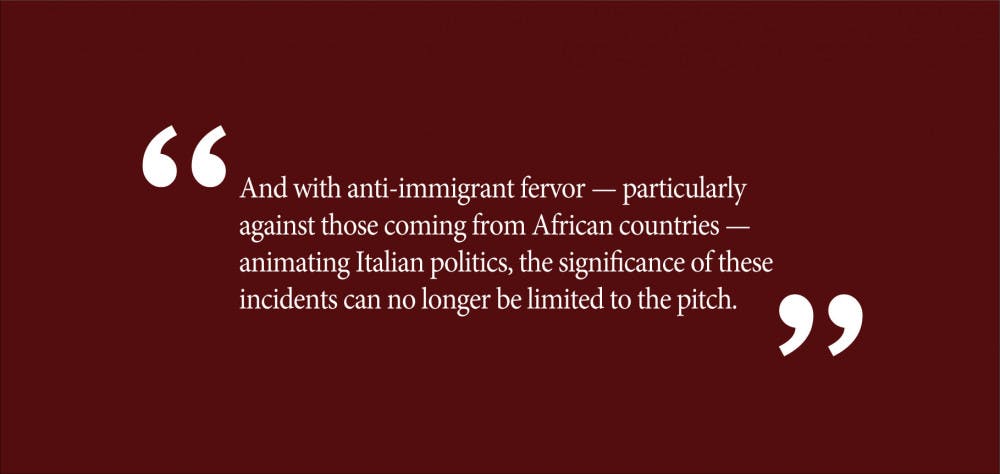The season had hardly begun when Italian football’s most vile tradition reared its head. On Sept. 1 — just the second matchday of Serie A (Italy’s top league) — Inter Milan’s Romelu Lukaku readied himself for a penalty against rival club Cagliari. As the Belgian striker stepped up to take the shot, hordes of Cagliari fans began a prolonged series of monkey chants. The abuse continued after Lukaku, who is of Congolese descent, calmly converted what would prove to be the match-winning goal.
Unfortunately, the abuse endured by Lukaku is all too familiar for players of African descent who play in Serie A. After the incident, there was a disturbing acceptance of such behavior from fans and officials alike, whose comments suggested that it is simply part of the game. And with anti-immigrant fervor — particularly against those coming from African countries — animating Italian politics, the significance of these incidents can no longer be limited to the pitch.
Following the match, a recording of the incident circulated on social media and received widespread condemnation. But the gravity of the racial abuse seemed lost on those at every level of Italian football. In a Cagliari press release, the club stated that it “firmly rejects what happened Sunday night against Inter Milan,” calling it a “slanderous accusation against the Sardinian people.” An organization of Inter Milan fans — Lukaku’s own club — told the striker to learn the ‘ways’ of Italian football. “We understand that it could have seemed racist to you, but it is not like that,” the fan group, Curva Nord, said. “In Italy we use some ways only to help our teams and to try to make our opponents nervous, not for racism but to mess them up.” And the governing body of Serie A declared that there was insufficient evidence to issue a punishment against Cagliari, despite videos that clearly indicate otherwise.
Even teammates and managers show little camaraderie when it comes to supporting those who suffer racist abuse. When league champions Juventus visited Cagliari last season, home team fans taunted 19-year-old forward Moise Kean with epithets and monkey sounds throughout the entire game. When Kean, an Italian born to Ivorian parents, scored a late goal to secure victory for his side, he stared at the crowd and raised his arms — a silent rebuke to the loathsome din of the Cagliari ultras. Yet when asked after the game about the crowd’s behavior, veteran teammate Leonardo Bonucci chose to equivocate: “I think the blame is 50-50. … Moise should not have done that, and the (fans) should not have acted that way.” Then-manager Massimiliano Allegri also saw fit to criticize his teenage forward, saying that “he should not have celebrated in that manner” and that he “provoked” the fans’ racist vitriol.
Notably, both of these incidents took place at Cagliari’s Stadio Sardegna, where fans of the island’s club have long spewed racist invective toward players of African descent while cheering a club conspicuously lacking any such players (another Inter Milan striker, Cameroonian Samuel Eto’o, faced similar abuse in 2010). But racism from ultras — the most fanatical of a team’s supporters — extends to the Italian mainland. Curva Nord, the group of Inter Milan ultras who dismissed the abuse of Lukaku, directed monkey sounds at Napoli defender Kalidou Koulibaly last season. Racism is sadly ubiquitous among Italian soccer fans; as an 18-year-old, Italian striker Mario Balotelli had bananas thrown at him by supporters of A.S. Roma as he walked through the capital.
And while racist abuse exists in the other top leagues of European football, only in Italy does it enjoy political support. The racism of the ultras reflects a pernicious xenophobia that pervades Italian politics, especially as immigration from sub-Saharan countries has accelerated. The Northern League, a far-right party, won 34 percent of seats in May’s parliamentary elections with a largely nativist message. Earlier that month, party leader Matteo Salvini stood in front of a cathedral in Milan and delivered an anti-immigrant screed, calling for a defense of Christian Europe in the face of “replacement by foreigners.” In his 15 months as Interior Minister, Salvini delighted in threatening the rights of immigrants and trafficking in open racism. He has closed ports to refugees on multiple occasions; he has vowed to “send home” undocumented immigrants; he has tweeted a video of an African migrant with the caption “Go home!!” And while Salvini was ousted as Interior Minister on Sept. 5 after the formation of a new majority parliamentary coalition, he remains influential in Italian politics; The League’s anti-immigrant message continues to invigorate voters.
Unsurprisingly, Salvini has voiced support of the ultras’ racist behavior on multiple occasions. He mocked a rule by the Italian soccer federation that would suspend games in the event of racist chants, joking that there would be a “Richter scale for booing.” Salvini also downplayed Curva Nord’s racist abuse of Koulibaly, saying that “healthy teasing among fans is not to be considered racism.” Indeed, as racism and xenophobia are resurgent in Italian politics, they are reflected in the taunts of the ultras.
So as another season of Serie A gets underway, it seems likely that further abuse will follow. The Italian soccer federation issued a superficial “anti-racism initiative” in the wake of Lukaku’s abuse, but its decades of inaction signal a tacit acceptance of the ultras’ venomous behavior. And as these fanatical groups (many with neo-fascist sympathies) unleash their bigotry with impunity, they show the persistence of racism in Italy — in the stadiums and beyond.
Derek Simshauser ’20 can be reached at derek_simshauser@brown.edu. Please send responses to this opinion to letters@browndailyherald.com and op-eds to opinions@browndailyherald.com.





